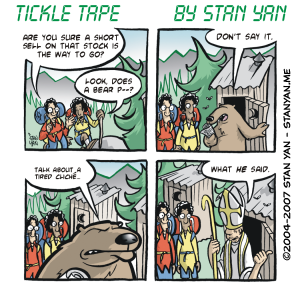If you’re like most traders, you’ve worked long and hard to build up trading capital. Putting it on the line, even small amounts at a time can be difficult. But losses are commonplace in trading, and to maintain your sanity, it’s necessary to take losses in stride.
Many traders blow losses out of proportion. In “The Mind of the Markets,” F. J. Chu (1999) notes, “The very common phenomenon of personalizing profits and losses often proves disastrous. The linking of ego or self-worth with profitable and unprofitable decisions transforms what should be a dispassionate financial decision into an emotional decision.”
It may be difficult, but the professional trader learns how to take losses nonchalantly. In his Innerworth Master Interview, Dan described how he reacted to a big loss professionally and objectively: “One time I lost virtually everything in one or two days, and a good friend of mine came over. I think I lost four or five hundred thousand dollars or something like that. I told him, ‘It’s only cash. It’s not my life that I lost. I can get it back. It’s not the end of the world.’ When I lose, I’m not losing my house, my car, my credit cards, or my friends. I made a mistake. I’m angry that I made a mistake, but the cash has nothing to do with it.” It’s important for traders to put losses in perspective.
It’s also important to avoid elevating the importance of money. In “Reminiscences of a Stock Operator,” Larry Livingstone observed that when he set his lifestyle standards too high, he often mounted big losses shortly thereafter. Seasoned traders at the CME have observed that when a trader buys a flashy new sports car, he or she usually ends up cracking under the strain of having to maintain a lifestyle of luxury.
In his Master Interview, Dan suggests taking a frugal approach to financial possessions: “I divorced myself from material items a good 20 years ago. By the time I was 25, I had no desires for material items. I’ve learned over the years that money is only a substitute for love. Material things, like cars and homes, are just substitutes as well. It just became clearer with self-exploration. In getting clearer, I divorced myself from the emotions of the stocks, the emotions associated with money and greed. Money just doesn’t buy you happiness.”
When you make a trade, put your money on the line, not your ego. It’s hard to fight against the natural human reaction to feel personally hurt when you lose money, but professional traders do it, and so can you. One way to take losses in stride is to trade only with money you can afford to lose, not money you need for basic living expenses. If the loss truly means little to you, you will know you can survive the loss, and this knowledge will allow you to stay calm. But if you just can’t afford to lose, you’ll have trouble convincing yourself that it doesn’t matter.
It does, and you know it. Losses shouldn’t hurt. If you control your risk, you can handle losses more easily. If you minimize the amount you risk on any single trade, it won’t hurt your account balance very much. Finally, don’t take losses personally. View a trade as a business transaction. It’s not about you or your self-worth. You have self-worth no matter how much you win or lose in the markets. If you remember this fact, you’ll be able to take losses in stride.


